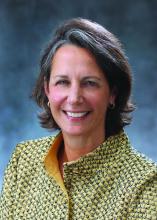Winds of change at the American Board of Surgery: An interview with Executive Director Jo Buyske, MD, FACS
Just as surgeons must maintain currency in their profession, the American Board of Surgery is doing the same: revising and reinventing the recertification process to better fulfill its mission. The ABS aims to make the recertification a lifelong learning activity that is more relevant to the way surgeons actually practice. The high-stakes exam taken every decade will be supplemented with other options for demonstrating competence and currency in various surgical specialties.
Dr. Buyske will be the first woman to assume the role of Executive Director of the ABS, and she will take the lead in implementing the overhaul of recertification.
We asked Dr. Buyske to share with us some of her insights on the new direction of the ABS, the challenges ahead, and her plans to carry out the mission.
Surgery News: The recent ABS announcement regarding a new direction for the program of recertification has come at a time when many medical specialties are facing challenges in the means by which practitioners are required to demonstrate currency in their fields. Is this initiative a response to complaints from surgeons about the Maintenance of Certification (MOC)?
Dr. Buyske: The ABS has been looking at options for the initiation and maintenance of certification for over 10 years. This effort isn’t really reactive but an ongoing process in the works for some time. This initial statement is a first swing at an attempt to better serve the profession. We all understand that it is necessary to stay up to date and demonstrate mastery.
SN: What has been the response from the Diplomates to the announcement?
Dr. Buyske: We haven’t gotten formal feedback yet, but all the response has been quite positive and, rightfully, conservative. People say, “That sounds good, but what does it really mean?” This is an entirely legitimate question, because all we really said is that we are going to change the process, make it more practice focused and less onerous. That sounds good to many. Diplomates want to know the practical implications of this approach.
SN: What happens now in this process of overhauling the recertification process?
Dr. Buyske: We have a hardworking, fast-moving task force that is taking up all the information we have gathered over the past months and years. We did a survey at this time last year that gave us a lot of information about what the Diplomates want. The concerns were on a more practice-focused recertification process, and also one that is less onerous in terms of cost and time away from practice for study and travel.
Right now, the task force is fanning out across the country to talk to state and local societies, regional representatives, and nominating societies to ask for time on their programs to meet with their members and leadership. The objective is feedback and input to help us get a handle on what people’s practices are really about.
Mary Klingensmith, MD, FACS, the Mary Culver Distinguished Professor and the vice chair of education in the department of surgery at Washington University in St. Louis, has been elected as the chair of the ABS. She will be leading a town hall at the American College of Surgeons Clinical Congress in October to discuss the process and get input.
The communications division will be recruiting additional staff and will be undertaking another survey. We will be asking ABS directors to be a presence in their regional societies and to listen to their members on behalf of the ABS. We also hope the directors will participate in the ACS Communities and be a part of a discussion on recertification.
The task force timeline will be to have a basic structure for 2018, but this will not be a final project set in granite. We will have more options available in 2018, and we will continue to roll out ever more options. This is a moving target and needs to be continually reassessed as technology improves and practice needs change. And we will get better as time goes on at understanding what practices are about and what the needs of recertification are.







